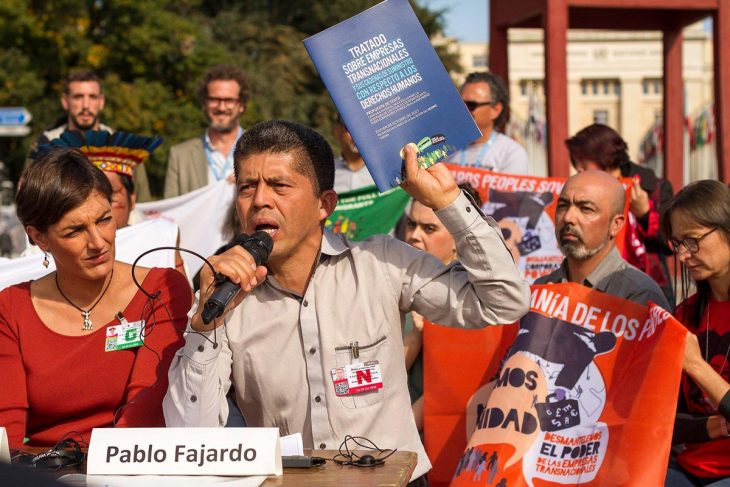This attempt has gone further than any other in the drawing up of a binding international treaty, which lawyers and activists working on corporate responsibility have been urging for nearly 50 years. The draft treaty has been under negotiation since 2014 by 47 States meeting at the United Nations Human Rights Council. Meeting for the 50th session from October 14 to 18, the intergovernmental group charged with drafting such a treaty still seems to have a long way to go.
Dozens of NGOs and organizations forming the Global Campaign to Reclaim Peoples Sovereignty, Dismantle Corporate Power and Stop Impunity are watching closely to try and get a solid legal instrument and strong implementation mechanism. This ambitious goal was originally put forward by Ecuador, which initiated the project, at a time when left-wing president Raphael Correa was in power.
Since 2017, new president Lenin Moreno has pursued a completely different policy, more favourable to the interests of the European Union (EU) and the United States. "Within the UN working group that it chairs, Ecuador has changed its position. Under EU pressure it has abandoned the ‘red lines’ it had set to obtain a quality treaty," says Adoración Guamán, a law professor specializing in corporate responsibility at the University of Valencia (Spain) and the Latin American Faculty of Social Sciences in Ecuador. Today, the Ecuadorian mission to the United Nations is more discreet. It declined to answer questions from JusticeInfo.
Watered down
In the new version of the text discussed in October, the human rights responsibility of transnational corporations has disappeared, says Guamán. "This puts everything back on the States. But it is precisely because governments are unwilling or unable to regulate these firms and make them pay for human rights violations at local level that we need an international treaty. Guamán regrets, like NGOs, that the current project now covers all companies, rather than focusing on transnational corporations, which she thinks weakens its scope. "As it stands, the treaty does not meet the challenge of globalization."
The professor recalls the case of US firm Chevron, which was ordered by Ecuador's courts in 2011 - after a big campaign - to pay 9.5 billion dollars for the pollution of the Amazon caused by its subsidiary Texaco. "Chevron simply left the country without paying anything, and an international arbitration tribunal on investments even ruled in favour of the oil giant," she says. "Free trade treaties have created a climate of impunity that gives extended rights to multinationals, but no duties".
To redress this imbalance, NGOs of the Global Campaign, the Europe Third World Centre (CETIM) and Corporate Accountability insist that the treaty under negotiation should restate the primacy of human rights over trade rights. But again, they have not so far found sympathetic ears, any more than on the principle of joint liability of the parent company, its subsidiaries and the subcontractors it controls. "Without this principle, it is very easy for a multinational to transfer its responsibilities to others. This is a fundamental point," explains Melik Özden, CETIM director in Geneva.
Very few States backed this view during the October session. "There have been significant differences on these points, but the governments that spoke the most are not yet strongly defending our positions,” admits Boston-based Shayda Naficy, head of Corporate Accountability. “Much more pressure from civil society will be needed."
Worst case avoided
This year, NGOs even had to fight to avoid the worst case scenarios: being excluded outright from the negotiating forum, as proposed by Brazil; the threat of withdrawal by states like China; or even the hasty adoption of a treaty devoid of any substance. Özden is nevertheless optimistic. "In reality, we won a battle," he says. "Attempts to marginalize us have been defeated." The chairmanship of the working group was tasked with receiving all proposals from States and civil society by February, then conducting broader consultations at the regional level, before proposing a new text for the October 2020 session.
For the member organizations of the Global Campaign, the process under way is as important as the desired result of a formal treaty. "The very existence of this process serves as a point of mobilization, makes this problem visible to a wide audience and shows the need for comprehensive solutions," Naficy insists. "Negotiations on the Declaration on the Rights of Indigenous Peoples [adopted in 2007] lasted nearly 30 years. The process itself changed States' perception of what is acceptable and what is not. Today, we are carrying out a process of cultural change and awareness-raising."
WHAT WOULD THE TREATY BRING?
The legislation of some States already allows a multinational company to be prosecuted for misdeeds committed abroad by one of its subsidiaries, in particular for war crimes and crimes against humanity. The Swiss NGO TRIAL International, which specializes in the prosecution of international crimes, nevertheless believes that the treaty under negotiation at the United Nations would facilitate bringing transnational firms before national courts.
"The principle would apply to a much broader range of crimes, not just war crimes and crimes against humanity, torture and genocide," explains Montse Ferrer, in charge of corporate responsibility issues at TRIAL International. “Article 7 of the current draft treaty provides that victims may file a complaint in the country where the violations took place, in the country where the victims reside or in the country where the alleged perpetrators (legal entities or individuals) are based. It would extend the possibility of prosecuting a multinational or its leaders in one country for acts committed in another.”
Finally, the existence of the treaty would encourage national prosecutors and judges to handle more cases. "Cases of multinational companies prosecuted for human rights violations are still few,” says Ferrer. “At a time when major economic and geopolitical interests are at stake, an international convention would give them more legitimacy and courage."
In 2015, a TRIAL International complaint filed in Switzerland against the gold refiner Argor was dismissed by the Office of the Attorney General. It deemed that there was not enough evidence to charge the firm with alleged money laundering and complicity in looting linked to the conflict in the Democratic Republic of Congo.






